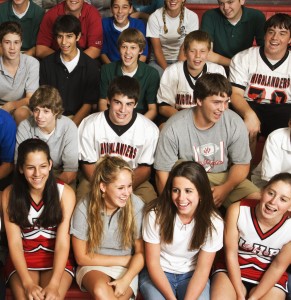
Do as I say and not as I do.
That statement is absolute malarkey.
Your youth are watching you each and every time you see them. You’re a role model whether you want to be or not. It’s part of the territory. They’ll notice when you’re saying one thing but doing another.
And we’re all human, I get it – we all make mistakes. But living as a role model means that when you make a mistake, you also admit it and apologize if necessary.
I need to show compassion to my youth – because I expect them to show it to others.
I need to forgive – because I want them to learn to forgive others (especially me!).
I need to express my feelings honestly and appropriately – because it’s important for them to do the same.
I need to try new things, even if they scare me – because I want my youth to take leaps of faith.
I will tell you though, it’s not easy. You’re not alone.
Confession time
I used to HATE having to apologize to a group of youth when I got something wrong. As they say though, practice makes perfect, and I make a lot of mistakes. I’ve had a lot of opportunities to apologize and now, I can honestly say, I still hate it. It is easier than it used to be though, even in the midst of my ‘I hate this’ feelings.
Today I wanted to scream. One youth made me so mad… actually it was the whole group – they were just wound up. Ironically, we were learning about sharing our feelings in a prescriptive way:
‘I feel (insert feeling word here) when you (insert the other person’s action here).’
So, despite feeling really angry, I had to understand my anger and manage my actions. I had to model saying:
‘I feel (frustrated) when you (don’t listen to the instructions I’ve given you).’
Doesn’t that always seem to be the way – that what you’re working on with your youth is often just what you need the most personally?!
Sometimes my Girl Scout volunteers bail on me, or they turn up but sit there without helping, or they speak unkindly to me or one of the girls. However, the final line of the Girl Scout Law is ‘be a sister to every Girl Scout’ and we’ve been working on it as troops for over a year now. If I can’t be a sister and role model to my Girl Scout volunteers, how can I show the girls what it means to be a sister to one another?
Fear
I have literally cried in front of almost every group I’ve ever taken on a residential (youth retreat).
I really dislike climbing.
I also found I really dislike getting strapped to a racing bike and sent off on a velodrome without any brakes on the bike.
I also dislike rapelling or abseiling.
And any kind of high ropes.
I’m also not a huge fan of skiing.
Or going fast.
OK, this list is really starting to make me sound like a whiny baby! I just like what I like and I’m just not overly adventurous (unless we’re talking about water sports – I seriously love those!).
But you know what?
I’ve climbed to the top of a 60 foot climbing wall.
I’ve abseiled down off a 45 foot drop.
I’ve sort of leapt off a platform (Not one of my finer moments – scooting off on my bottom and dangling there, but I tried it nonetheless and trying is what I expect of my youth).
I’ve skied indoors and out.
I’ve been on the velodrome at Calshot seven times.
Why? Because I want my youth to push themselves a little further. I want them to try, even if they’re scared. I model that too. I cry and shake, but I do it. Even just a little bit, then I push myself one step further.
Be A Role Model
Your youth will follow your example. Your actions do speak infinitely more to them than your words (I know it’s a cliche but it’s so true!).
So try, laugh, cry, forgive, explain, apologize, comfort, discipline, love, show patience, make mistakes and be real. These are the things life is made up of and you’re putting your youth in a great position to deal with them when you’ve shown them it’s possible first.
Question: When have you had to live something out in front of your youth? How did it go? We’d love to hear about your experiences as a role model in the comments below.
You can also connect with us by:
- Signing up to receive our posts via email
- Following us on Twitter
- Liking us on Facebook
- Signing up to our RSS feed








 Back in 2012, I
Back in 2012, I 